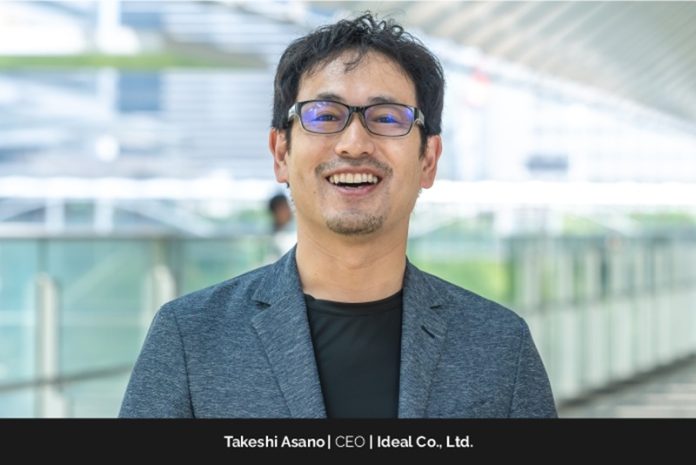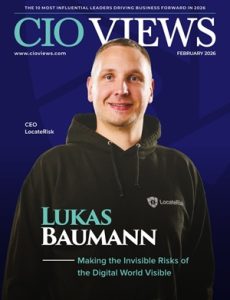“Feedback is a two-way street at Ideal,” says Takeshi Asano, CEO of Ideal Co., Ltd. “And our model ensures that improvement is baked into the way we work.”
In today’s volatile business environment, where rigidity often stifles innovation, Takeshi has carved a different path. At Ideal, he and his team endorse a culture of reflection, agility, and mutual trust. His organization operates without traditional employees. Instead, it is built on a fluid network of contract-based professionals who are empowered to shape their own workflows.
This flat structure, free from conventional hierarchies, fosters a rhythm of reflection and renewal. The venerable CEO notes that every contract is periodically reviewed, which helps maintain ongoing dialogue with each professional and keeps the organization responsive and aligned.
Ideal doesn’t impose a top-down mindset. Instead, it flourishes on collaboration. By listening closely to the preferences and feedback of its people, the company has cultivated a positive culture that drives both individual and collective growth.
A Leadership Philosophy Forged by Observation
Takeshi’s leadership philosophy was shaped by years of watching brilliant professionals fall short of their potential. During his two decades with global consulting firms, he rose into management early and worked alongside high-caliber talent. Yet he frequently saw skilled individuals become sidelined, not because of ability, but due to internal bottlenecks, rigid hierarchies, or burnout caused by poor work-life integration.
These experiences revealed a consistent truth: the problem was rarely the people. It was the system. Professionals often had the insight and drive to excel, but the environment around them made it impossible to sustain or scale that performance.
Determined to create something different, Takeshi founded Ideal Co., Ltd. He intended to build a company where professionals were treated as peers rather than subordinates. He designed the company not around job titles but around trust. Professionals work through flexible agreements shaped by their strengths and aspirations.
To reiterate, Ideal engages a community of skilled professionals through flexible contracts. Rather than prescribing processes, it honors autonomy, inviting each collaborator to work in the way that suits them best. Takeshi views each collaboration as a partnership. By prioritizing flexibility and mutual respect from the outset, the company creates space for people to perform at their peak while staying deeply invested in synergistic outcomes.
Work-Life Balance Formula
He doesn’t believe in trading one kind of success for another. While running a forward-thinking company, he remains fully present at home as a husband and father of three. “My family is the most important part of my life,” Takeshi often reflects.
Early on, he noticed how many leaders allowed their personal lives to erode under constant demands. He chose to build a different framework that integrated harmony by design. To maintain balance, Takeshi revamped Ideal’s operations to run without requiring his daily oversight. With automation and AI in place, the company runs seamlessly, freeing him to nurture mission-critical relationships and stay fully engaged during family moments that matter.
This structure benefits more than just his personal life. It sharpens his leadership. Takeshi believes that leaders who are grounded outside of work make clearer, more thoughtful decisions inside it. That clarity helps him stay focused on long-term goals while staying true to his core priorities.
Redefining Impact in a Hyper-Automated World
Takeshi’s definition of impact begins with people. At Ideal Co., Ltd., their vision is anchored in a simple but powerful mission: “Enrich the world, through the power of professionals, effortlessly.” It’s about creating conditions where individuals can contribute fully without compromising their well-being or identity.
At Ideal, professionals don’t wade through red tape. They focus on work that matters and deliver results without being drained by bureaucracy.
Technology plays a central role in this vision. Takeshi envisions a future where automation handles most operational processes, allowing people to focus on strategy, creativity, and meaningful interactions.
Still, he’s clear that efficiency cannot come at the expense of connection. Even as Ideal deepens its tech stack, its CEO ensures the human element stays central. His approach combines system-level productivity with individual dignity, demonstrating that scale and empathy can coexist and grow in tandem.
Letting Go to Grow
In the early days of Ideal Co., Ltd., Takeshi was involved in every project, overseeing each detail to ensure quality. But as the company grew, he began to notice something troubling. What once felt like stewardship had become a tie-up. His instinct to stay hands-on started slowing the business down.
The turning point came when he acknowledged that control was stalling momentum. The solution? Delegating leadership. Ideal began appointing project leads, the seasoned professionals responsible for managing teams and client relationships through flexible contracts.
This transition unlocked a new phase of growth and brought a more in-depth realization: organizations scale better when responsibility is co-owned rather than centralized. For Takeshi, it was a key leadership lesson. Trusting others to lead not only protected quality but also made the company more adaptable. By building systems that support distributed ownership, Ideal became more resilient and better equipped to meet the demands of expansion.
The Moment That Sparked a Mission
In 2017, Takeshi walked away from consulting. After years in the field, he had shifted his focus to investment, believing that chapter had closed. But one unexpected email changed everything.
It came from the CIO of a former client, someone with whom Takeshi had clashed professionally. “There’s something I’d like to consult you about,” the message read. Still, he agreed to meet once back in Japan.
What followed reframed his path.
The CIO didn’t dwell on pleasantries. He explained that their critical project was faltering and they needed someone who could truly steer it forward. Despite past tensions, he admitted that Takeshi’s integrity and calm, pressure-free approach had left a lasting impression, and he believed it was Takeshi who could turn things around.
Then came the unexpected offer. The CIO said, without hesitation: “I’d like to entrust the entire direction of the project to you. Please just move it forward as you see fit.”
That moment reminded Takeshi of something essential. Meaningful impact doesn’t rely on a designation. It emanates from the value you deliver and the trust you earn. This realization pulled him back into the consulting world and ultimately led to the founding of Ideal Co., Ltd.
The experience also planted the seed for Ideal’s core philosophy, where professionals’ power is the engine, enriching the world is the outcome, and the process is effortless. What started as one act of trust now powers everything Ideal stands for, including its mission, model, and mindset.
Shaping the Future of Work, Thoughtfully
Looking ahead, this prescient CEO sees Ideal Co., Ltd. evolving into more than a company. It’s becoming a platform where CxOs and professionals connect, collaborate, and contribute on their own terms. The aim is to reduce executive isolation, promote authentic work models, and apply technology to amplify human capacity rather than replace it.
Tasks that once consumed hours are now managed through intelligent automation. As they say, “Walk the talk.” Takeshi himself has streamlined much of his daily work in this way, allowing more space for creative thought and purposeful interaction. These practices are now being implemented across the organization.
By endorsing smarter, sustainable ways of working, Ideal is building a culture rooted in autonomy, clarity, and balance. To Takeshi, the objective is to help people work and live better through thoughtful design and purposeful leadership.
Advice for the Ones Who Will Carry It Forward
The weight of shaping the future rarely falls on those who follow. It rests on the shoulders of leaders willing to evolve first. For Takeshi, that evolution begins outside the office.
He draws insight not only from C-suite corridors but from every role he embraces, such as investor, athlete, sponsor, and most significantly, father. These diverse experiences inform how he leads, listens, and builds trust, making him not just a leader but a truly relatable one.
Leadership, he believes, is not about control. It’s about energy and knowing how to replenish and share it. “Stay open to the world,” Takeshi advises. Curiosity, not certainty, is what fuels transformation.
He encourages aspiring leaders to welcome challenges that test their assumptions. “The best leaders are those who evolve constantly,” Takeshi observes, “not just in skillset, but in worldview.” Real influence is tempered by lived experience.
Moments That Reset the Game
As one among ‘The Most Inspiring Business Leaders Making a Difference in 2025,’ he stands not just for what he built, but how he changed.
Reflecting on his journey, Takeshi conveys that his proudest achievement is the evolution he has undergone in leadership. Early in his career, he was driven and individualistic. Over time, the real lesson surfaced: impact comes from service. He learned to lead by enabling others, including clients, partners, and his own team.
That shift shaped everything that followed. Without it, Ideal wouldn’t exist. For Takeshi, leadership is a commitment to ongoing growth both personally and professionally, in lockstep with the people he leads.
Where Ethics Shape the Bottom Line
At Ideal Co., Ltd., ethics isn’t an afterthought. It’s embedded in the architecture of how they operate.
Takeshi and his team believe that sustainable success begins with accountability to clients, collaborators, and society. Ideal’s flat structure reinforces open dialogue and gives space for ethical clarity at every level of decision-making. Because the company works exclusively with independent professionals, each partnership begins with mutually defined expectations rooted in unified values.
Internal guidelines prioritize fairness, inclusivity, and psychological safety as non-negotiables in a diverse, decentralized model. Takeshi personally upholds these standards, even when it requires difficult calls. In one case, the company parted ways with a highly competent consultant whose behavior conflicted with their core principles. Though initially met with resistance, the move ultimately strengthened client trust and internal cohesion.
Beyond policies, Ideal works to reduce stress, prevent overwork, and protect long-term well-being. “When people are treated well, performance and trust follow naturally,” Takeshi affirms. For Ideal, people-centered practices aren’t cultural perks; they’re strategic imperatives.
A Difficult Decision That Benefited the Broader Impact
One tricky point for Takeshi involved going against the grain to do what was right. But he did not waver. Midway through a major project, he made the difficult call to terminate the contract of a high-performing professional. Although the individual met deadlines and was praised by senior stakeholders, feedback revealed they were creating a hostile environment for their teammates. Some clients defended their conduct, but Ideal’s internal code flagged it as potentially harassing behavior.
Despite knowing the decision might disrupt momentum, Takeshi informed the client and replaced the professional. Resistance came quickly, but so did results. The team dynamic improved, and the project avoided the stress-related dropouts that had derailed earlier efforts.
The experience reinforced a core truth for Takeshi: leadership entails protecting long-term trust and well-being. In doing so, he safeguarded not just project outcomes but Ideal’s reputation for ethical, people-first delivery.
Fueling Contribution Through Shared Mission at Ideal
What sets Ideal apart isn’t just how people work, but why they do. CEO Takeshi believes that actual empowerment occurs when professionals connect with a purpose, not policies. That’s why Ideal doesn’t simply assign tasks; it prioritizes them. It frames every project around a mutual belief in creating value that lasts.
The company’s mission is introduced early and revisited frequently, not as a motto, but as a guiding mindset. “It’s not a slogan,” Takeshi says. “It’s a lens through which we view all relationships and actions.”
Within this culture, professionals do more than contribute skills. They invest meaningfully in the company’s direction. That sense of alignment transforms everyday work into a collective pursuit of progress.
How Ideal Leadership at Ideal Makes a Difference
Takeshi brings laser-sharp clarity and unwavering presence to leadership at Ideal Co., Ltd. The company’s power stems from its unique ability to connect deeply with people, the broader picture, and its core purpose.
At Ideal, the team doesn’t just manage. Rather, it immerses itself in the work. They are keen observers, active listeners, and deliberate responders. Takeshi’s leadership isn’t about flexing authority. It’s about consistent execution, firm commitment, and calm accountability. This same approach has been translated to his organization.
The Ideal team isn’t left guessing; they know what truly matters. They’re empowered to call the shots, speak candidly, and sculpt successful outcomes. This mutual trust is earned and reciprocated, developing a work culture that’s both stable and stimulating.
Takeshi embodies leadership in every action at Ideal. It’s evident in their decision-making, their knack for empowering others, and their seamless ability to drive progress. This quiet discipline is the bedrock of Ideal’s steady, forward march.





